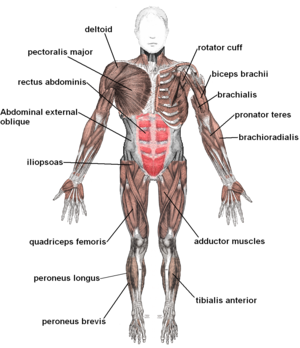
Collage of varius Gray’s muscle pictures by Mikael Häggström (User:Mikael Häggström) (Photo credit: Wikipedia)
Initially, the brain must focus on the mechanics of an action. Graceful movements don’t come into play until much later. Think of a child first learning how to walk and then as he practices and becomes more confident he runs.
Then, muscles learn movement from repetition. The more frequently the activity is performed the more easy it becomes and the faster it can be done without thought.
Timing is everything. As the muscle memory improves, it takes less time for the brain to message the muscle to move, the exercise can then be performed more quickly as the speed of the signals from the brain to the muscle get faster. As more repeated movements are carried out, they create pathways through the central nervous system, strengthening and improving the memory of the muscle.
Perfecting technique is the last, and for some, the most important component of muscle memory. Skill and focus are two key elements that are essential for attaining a sports performance advantage.
1. The more you practice and complete flawless movements, the better of an athlete you become. This is why it is NOT as important to “get through your routine” as it is to hone in on skill. How your muscles memorize the activity will affect the nature of your work out and the level of achievement.
2. Mental focus and attitude on initial success as good performance occurs, while avoiding pondering on failure, allows the feeling of success to be ingrained in the memory too.
The difference between a good athlete and a professional athlete is the degree and level that these two components are attained.
The good news for those who are just not quite able to make exercise part of a daily routine is that muscle memory lasts a long time. Scientists put this to the test when they compared two groups of women for eight months. After 5 months of strength training and an 8 month rest period, women who worked out, compared with those who never trained, saw results more quickly and even retained most of the muscle fibers that were created during the period of training.
Muscles may not just be something attractive to look at. As recently as two years ago, Kristian Gundersen and her colleagues discovered that muscle memory may also contribute to better health at the cellular level. It may affect gene integrity and activity while improving the immune system, hormones and reducing factors that have been linked to cancer, diabetes and much more. If you have a science background you can read about the discovery here, http://www.ncbi.nlm.nih.gov/pubmed/21040371.
Muscles can be great eye candy but it has been well established that exercise helps to improve insulin sensitivity and therefore has a therapeutic effect for those with insulin disorders, diabetes, polycystic ovarian syndrome, heart disease etc… So the idea that muscles also act as part of the whole body’s health system is not so far-fetched and something to really think about.
Exercise muscle memory to improve physical performance, health and well-being.






